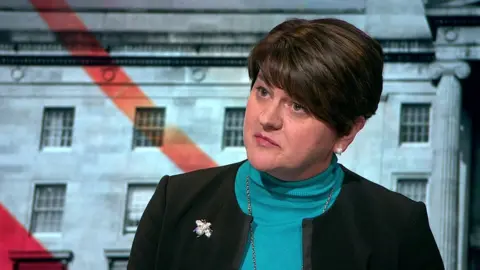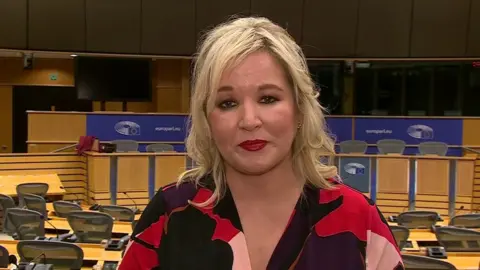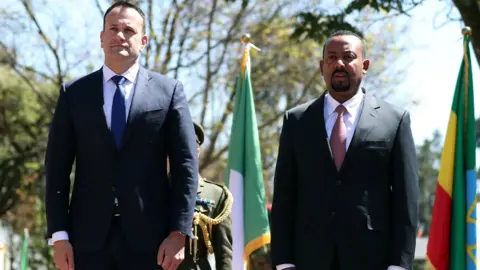Arlene Foster: Theresa May's Brexit backstop plan is 'dead'
 BBC
BBCTheresa May is still not listening to critics of her Brexit deal and is putting a plan to Parliament that is already "dead", Arlene Foster has said.
The DUP leader said proposals to give Stormont a say over new EU rules if the border backstop took effect after Brexit added nothing.
Sinn Féin president, Mary Lou McDonald, said "there must be no veto afforded to any party by anybody".
The Irish border backstop is the insurance policy to avoid a hard border on the island of Ireland, if another solution is not found through a wider UK-EU trade deal.
Cabinet Office Minister David Lidington told the BBC the government's plans amounted to giving the NI Assembly a "veto".
However, his official written statement to Parliament does not contain the word "veto".
'PM wasting time'
Mrs Foster said the DUP's opposition to the backstop remained firm.
"We would prefer if the backstop disappeared, what we've been presented with is a narrative and doesn't add anything," Mrs Foster told BBC Newsline.
She accused the prime minister of continuing to "waste time" and said it was disappointing it had taken other parties at Westminster so long to start calling for an alternative to the government's withdrawal agreement.
"We told Theresa May to stop wasting time last November, she is still not listening and she is going to put a plan to Parliament that is dead," she said.
Mrs Foster said the DUP had put an alternative forward last year, to remove the backstop and work towards a different deal - but the prime minister is sticking by her plan.
Sinn Féin has urged the EU and Irish government not to "blink" when it comes to fully defending the backstop.
The party's leadership, Mary Lou McDonald and Michelle O'Neill, were speaking after meeting EU officials.

Mrs McDonald said she had been given a "strong commitment" from Brussels that the backstop in the withdrawal agreement would be protected.
She added that as the Brexit negotiations approach the final stage, Taoiseach (Irish prime minister) Leo Varadkar needed to "hold firm and not panic".
Sinn Féin vice-president Ms O'Neill's message to EU officials and the Irish government was: "Don't blink, there can be no weakening of the backstop."
 Reuters
ReutersThe Irish government has said it could not support the government's latest proposals for Northern Ireland.
Mr Varadkar told reporters on a visit to Ethiopia: "I don't think we can have a situation whereby the Northern Ireland executive or assembly has a veto power because that would essentially give one of the two communities veto power over the other."
The Irish government has repeatedly said it will not allow the withdrawal agreement to be renegotiated, but would seek to offer the UK government political reassurances.
Mrs Foster said: "No-one wants throw Ireland under the bus, but what we want to see is a deal that is good for the whole of the UK and protects the union."
What is the government proposing?
The backstop is a position of last resort to maintain a soft border on the island of Ireland.
It would involve Northern Ireland staying in large parts of the EU single market, unless and until a long-term deal emerged that kept the border as open as it is now.
- Before the backstop would come into effect, the assembly would have to be consulted, with its views brought before Parliament ahead of a vote at Westminster
- The assembly would approve any new single market regulations for Northern Ireland introduced by the EU - updates to existing rules would automatically apply
- No divergence in rules applied in Northern Ireland and the rest of the UK
- Commitment to a role for the executive on the committees which would manage and oversee the backstop.
BBC News NI's business editor John Campbell said the proposals appear to fall short of an outright veto as they do not specify that the assembly must give agreement before the UK government acts.
What's changed?
The EU-UK agreement, known as the withdrawal agreement and signed in November, laid out the procedure for any new EU rules being introduced after the backstop is triggered.
The EU would inform the UK about the new rule and a joint EU-UK committee would discuss its implication for backstop within six weeks.
The committee either agrees to add the new rule to the backstop or if agreement isn't reached will "examine all further possibilities to maintain the good functioning" the backstop.
If there is deadlock - no agreement "within a reasonable time" - the EU is entitled to "take appropriate remedial measures".
The UK is now proposing that its position would be heavily influenced by the assembly.
Why have the proposals come forward now?
A vote on the draft withdrawal agreement is scheduled to take place in the House of Commons on Tuesday, after the original vote was cancelled on 11 December.
Mrs May relies on the support of the DUP's 10 MPs and it is highly unlikely the withdrawal agreement will be approved by Parliament if they vote against it.
The DUP has repeatedly said it is opposed to the backstop and the withdrawal agreement is worse than a no-deal Brexit.
Mrs May has been seeking extra written assurances from European leaders to try and gain the support of the DUP and many Conservative MPs who oppose her deal.
